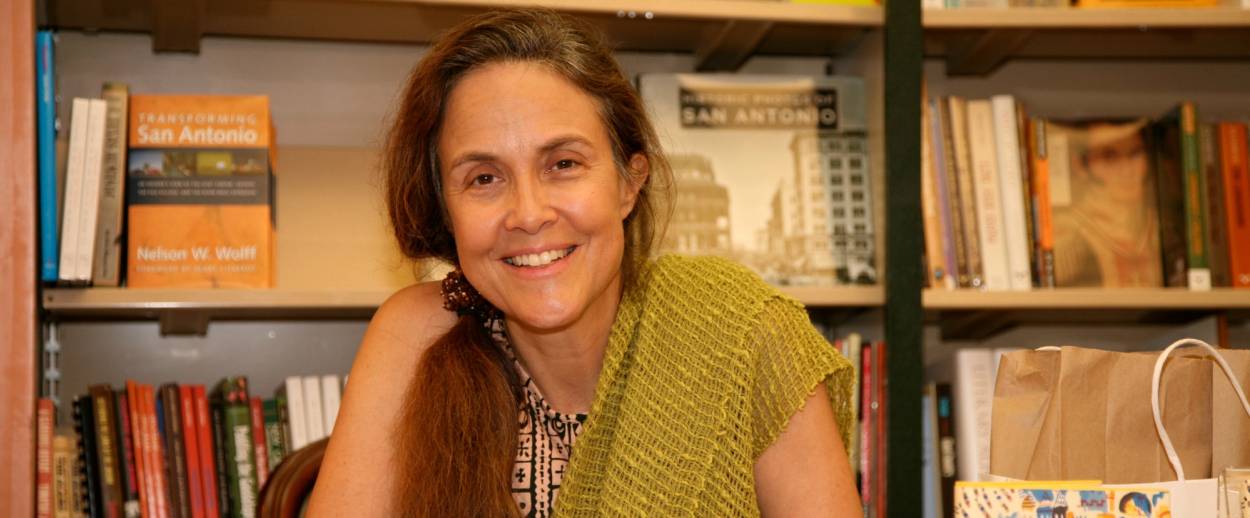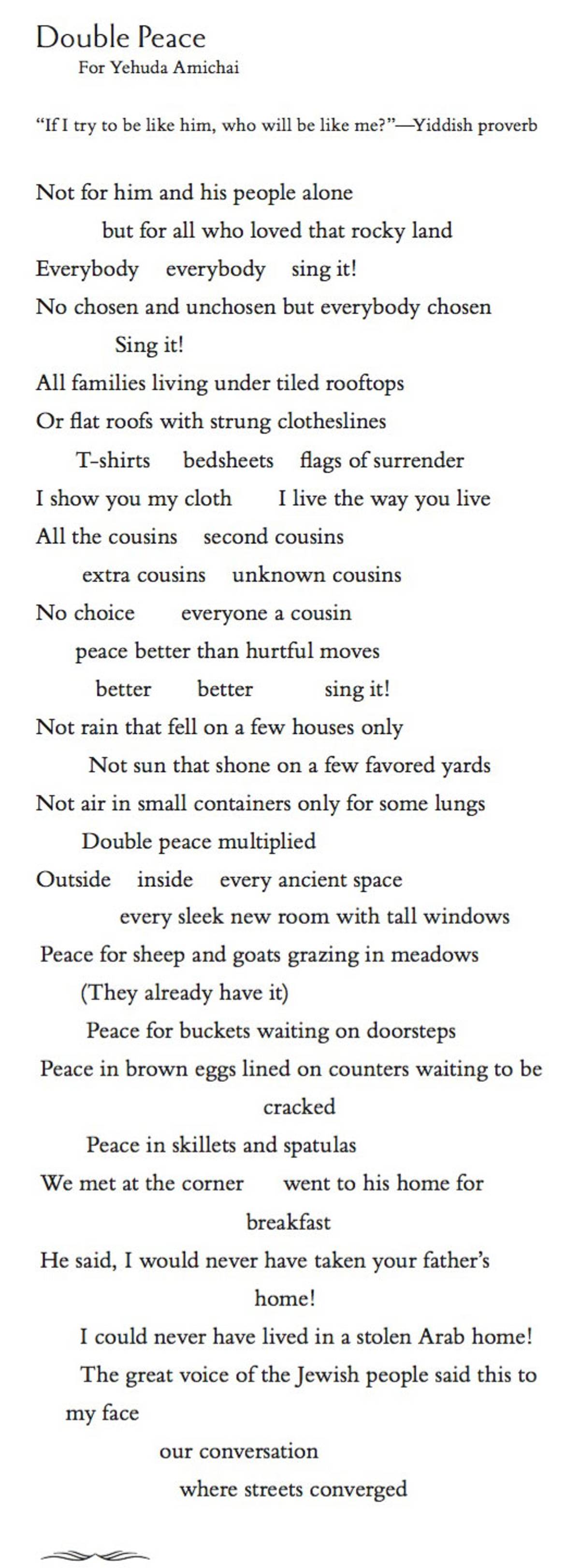An Encounter, in Verse, Between a Palestinian-American and an Israeli Jew
Naomi Shihab Nye and Yehuda Amichai walk into a bar




Actually, they ran into each other on the street in Jerusalem years ago. Nye, the award-winning author of dozens of books for children and adults, calls herself a “wandering poet” (she grew up in St. Louis, San Antonio, and Jerusalem) and served as Chancellor of the Academy of American Poets from 2010 to 2015. Amichai, of course, was one of the greatest Israeli poets of all time.
Nye’s newest book, Voices in the Air, is a tribute in poems—funny, thought-provoking, angry and sad poems—to artists, writers, historical figures and family members who’ve inspired her throughout her life. There are poems for Jewish authors Grace Paley and Vera B. Williams, but one of the most gripping poems in the book is about a chance meeting between Nye and Amichai.
“I was in Jerusalem for the International Writers Festival in Mishkenot Sha’ananim,” Nye told me in an interview. “I was among writers from all over the world. James Tate was there, and Shintaru Tanikawa, the great Japanese poet. One morning I was walking down a street in Jerusalem. This distinguished, elegant human being turned to me and said ‘I’d like to come to my home for breakfast right this minute.’ It was Yehuda Amichai! I nearly fainted! He was staring at my name tag. I’d forgotten to take it off. I said ‘I’m honored to meet you. Thank you for your poems.’ He said, ‘Where are you going? My home is a few blocks away. My wife is there. Come, let’s share breakfast.’”
She continued, “His wife was…a little surprised. No one really wants a guest at 7:45 in the morning. But she was so gracious, and we sat and drank coffee or tea and scrambled eggs with fresh herbs and beautiful pita bread. He’d been out buying the pita bread when he saw me. I felt like the luckiest person. We talked about The Situation as it was then, how concerned they were all the time because their son was in the army. They lived in daily anxiety over that. I said, ‘I can understand, because my family in the West Bank lives in daily anxiety as well.’ We talked about where my father’s house was that was taken in 1948, and he was very interested. He said how painful it was to consider that story having happened to so many people, to see something that wasn’t yours be taken by someone who says ‘It is now mine. Disappear, please.’ We talked about occupation in many countries. My father was troubled by America’s story as well; where are the Native people? why are they all pressed into this one place? I told [Amichai] that my father had been a journalist and editor in Jerusalem in the late ‘60s, and [Amichai] was so generously interested in his life…which I’m not surprised by, because that’s the job of poets: To pay attention and to be curious about others.”

Amichai’s and Nye’s conversation became a poem in Voices in the Air.
But that wasn’t all the two talked about. “We talked about Chana Bloch, who was one of his translators and a dear friend of mine, a great poet in her own right,” Nye said. “She died last year. She and I were frequently invited to present together, because people were interested in having a Jewish American and an Arab American talking together. And we loved each other and were such good friends, so to talk about the ongoing trauma of Palestine and Israel came naturally to us. It was always gracious. When we spoke in Houston, people said to us, ‘You seem like sisters.’ And we said ‘We are. That’s the tragedy of the story.’”
Given that Nye’s stories about both Bloch and Amichai are about listening as well as talking, it’s not surprising that the subtitle of Nye’s new book is “Poems for Listeners.” She explained, “I think we’re in a time of extensive chatter in the world, and people need to listen. Just to listen. To other people’s voices, to the voices of artists and educators and musicians, to anyone who isn’t just arguing about political discourse. We need to argue about political discourse, of course, but many people are feeling frustrated with so much talk and so little listening.” One reason she loves to write for children, she says, is that they’re still able to listen. “Kids are still idealists,” she said. “They have clearer eyes. They’re not so muddled. They’re not running for office. A kid is happy with a happy day.” She went on, “Right now especially, we’re seeing the power of their kind of straight talk. That young Cameron Kasky facing off with Marco Rubio was one of the TV highlights of the last year.”
Which brought us to the current administration. “I believe Jerusalem is a sacred city for three world religions, and it’s a mistake to tangle politics into it,” Nye said. “Jerusalem is better than that. It’s greater. The current administration is so small-minded; they don’t see the fabric of care, how many Jewish people are advocates for justice alongside Palestinian people who are advocates for justice.”
After our interview, she realized she’d forgotten to tell me the ending to the Amichai encounter. She emailed me while she was babysitting her sick grandson with the conclusion. “As I was leaving his home, Yehuda Amichai insisted on giving me his collection of love poems in Hebrew, which he signed to me in English. I don’t speak Hebrew but was honored to have this gift. When leaving the country at Tel Aviv Airport I was receiving the usual special treatment reserved for Arabs or half-Palestinians who have spent time in West Bank with their families. It was not pretty. While ransacking my bag, a security guard pulled out Amichai’s poems and said, ‘What is this? A book in Hebrew?’ He turned to the signature page and the warm inscription. He said, ‘How did you get this? Why do you have it?’ I said that Amichai had invited me to breakfast and given it to me as a gift as I was leaving. He motioned to the other interrogators. ‘She can go now. Put her things back in the case.’ Poetry to the rescue!”
Marjorie Ingall is a former columnist for Tablet, the author of Mamaleh Knows Best, and a frequent contributor to the New York Times Book Review.